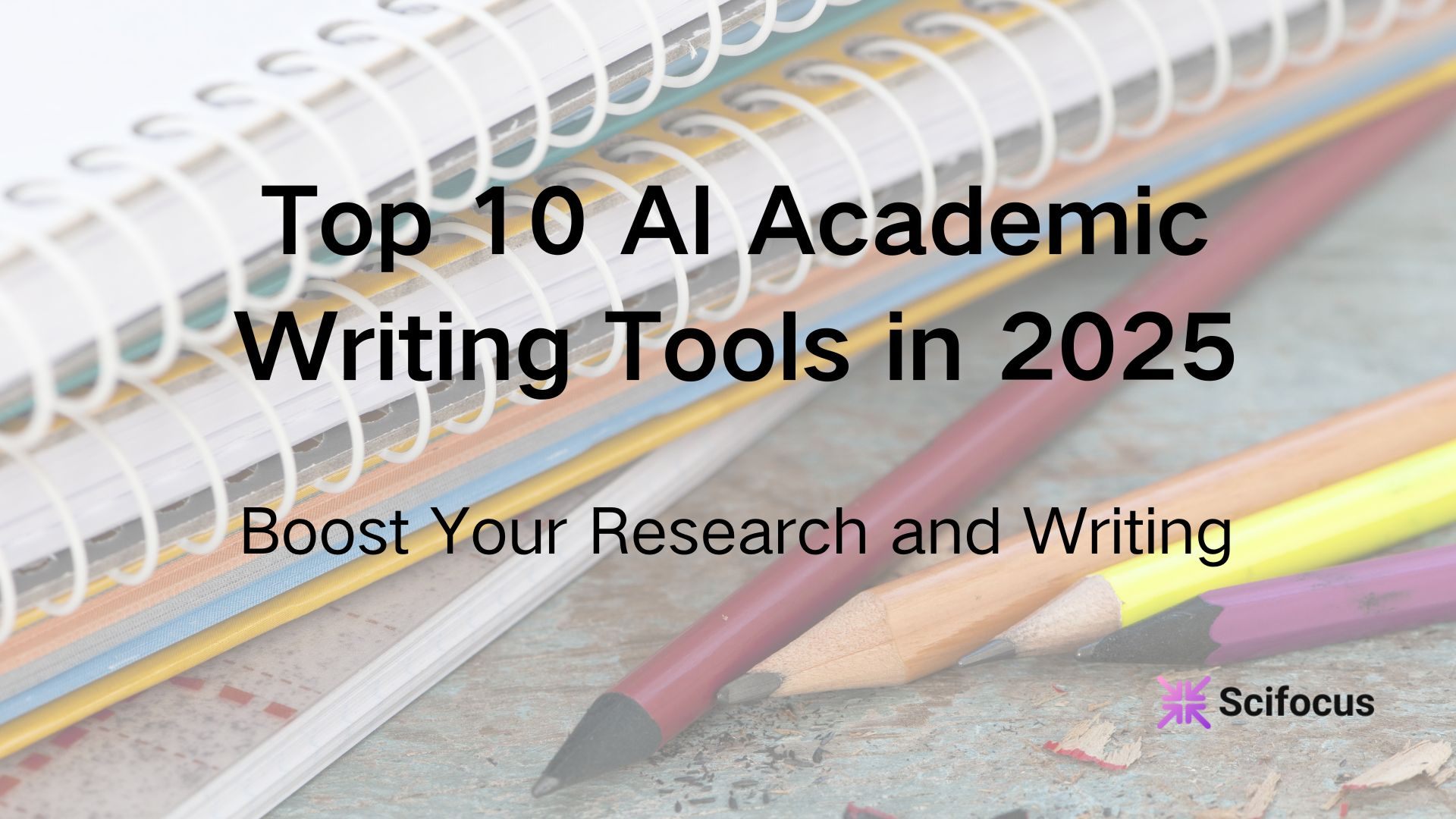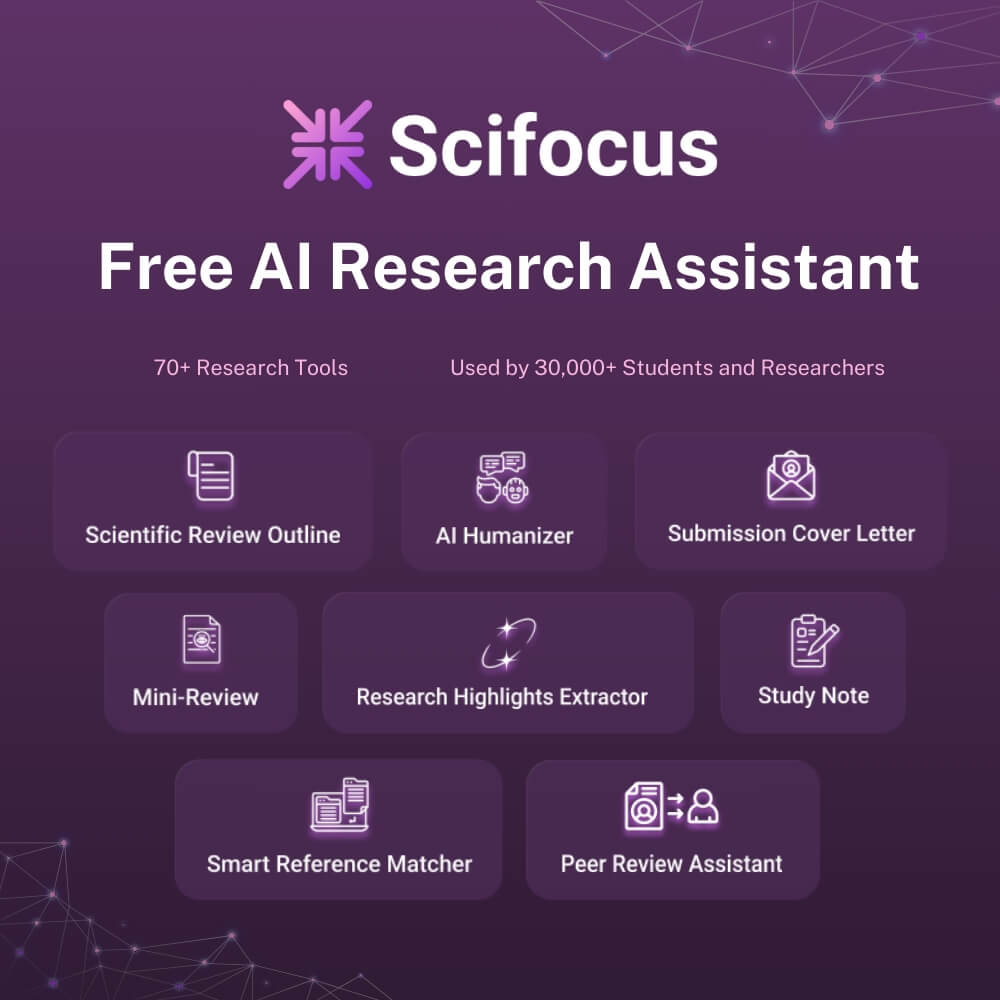Top 10 AI Academic Writing Tools in 2025: Boost Your Research and Writing

AI is revolutionizing the academic landscape, and nowhere is this more apparent than in academic writing. From undergraduate essays to doctoral dissertations and journal submissions, AI tools are no longer a futuristic concept but an essential part of the modern researcher's toolkit. They streamline tedious tasks, enhance the quality of your work, and help you overcome dreaded writer's block. Among the ever-growing number of options, Scifocus is establishing itself as the ultimate all-in-one academic assistant, but it's not the only player in the game.
Whether you are a student grappling with your first research paper or a seasoned scholar preparing a journal submission, leveraging the right AI platforms can significantly improve your workflow. This guide explores the top 10 AI academic writing tools of 2025, detailing their unique strengths and how to choose the best ones for your specific needs.
Why AI is a Game-Changer for Academic Writing
Academic writing is a meticulous process that requires precision, clarity, and rigorous attention to detail. AI tools are transforming this process by automating key stages, from initial research to final editing. They can help you:
- Accelerate Literature Reviews: AI can swiftly scan thousands of papers to identify key themes, summarize findings, and help you build a solid foundation for your research.
- Enhance Writing Quality: Beyond simple grammar checks, AI can suggest improvements in tone, clarity, and academic style, helping your work resonate with your target audience.
- Ensure Academic Integrity: Tools can identify potential plagiarism issues, ensuring your work is original and properly cited.
- Overcome Writer's Block: AI can generate structured outlines and even draft sections of text to help you get started, providing a framework to build upon.
By strategically integrating these tools, you free up more time for critical thinking, analysis, and the unique intellectual contributions that make your research truly valuable.
Top 10 AI Academic Writing Tools in 2025
1. Scifocus
Why It Stands Out: Scifocus is designed from the ground up to be the most comprehensive solution for academic writing and research management. It goes far beyond a simple text editor, acting as a complete ecosystem for scholarly work. Its AI models are specifically trained on academic literature, allowing them to retrieve the most relevant and credible papers, generate structured essays, and provide accurate citation support in popular formats like APA, MLA, and Chicago.
Key Features:
- Academic literature search and summarization: Scifocus can read and condense complex papers in seconds.
- Automated essay and research paper structuring: The tool helps you create a logical flow from introduction to conclusion.
- Grammar, style, and plagiarism checks: Ensures your writing is polished and original.
- Citation management: Effortlessly manage your references and format them for publication.
- Personalized research recommendations: The platform learns from your work to suggest new, relevant studies.
Pros: Comprehensive, time-saving, enhances academic quality.
Cons: The breadth of features may require a slight learning curve for new users.
2. Paperpal
Overview: An AI-driven tool specifically focused on improving grammar, style, and structure for research manuscripts.
Ideal For: Researchers and post-graduates preparing their work for submission to high-impact journals.
Unique Feature: Seamlessly integrates with major reference management tools, making it a powerful final-stage editor.
3. Turnitin
Overview: A long-standing, industry-standard plagiarism detection tool used by educational institutions worldwide. It checks for originality against a vast database of academic papers, publications, and web content.
Ideal For: Students and educators who need to ensure academic integrity.
Unique Feature: Provides a detailed similarity report with a percentage score and clear feedback.
4. SciSpace
Overview: An AI-powered tool that helps researchers efficiently read, annotate, and comprehend complex academic papers.
Ideal For: Students and researchers dealing with dense literature in fields like medicine or computer science.
Unique Feature: Its semantic search function allows you to ask a question and find the exact answer within a paper, saving hours of manual reading.
5. Consensus
Overview: A unique AI search engine that synthesizes information from multiple peer-reviewed studies to provide a "consensus answer" to a specific question.
Ideal For: Literature reviews, meta-analyses, and quickly finding the prevailing view on a topic.
Unique Feature: The visual "Consensus Meter" shows the level of agreement among studies.
6. Elicit
Overview: A versatile research assistant that organizes literature reviews and extracts key evidence from multiple sources.
Ideal For: Structuring complex academic research and building evidence-based arguments.
Unique Feature: It automates the creation of evidence tables, making the synthesis of findings incredibly efficient.
7. Research Rabbit
Overview: A visual and intuitive tool for exploring citation networks. It helps you discover related research and identify influential studies you may have missed.
Ideal For: Expanding your literature search and visualizing the academic landscape of a topic.
Unique Feature: Its dynamic co-authorship and citation visualization maps help you find key collaborators and groundbreaking works.
8. ChatPDF
Overview: A user-friendly tool that allows you to engage in an interactive Q&A with any PDF document.
Ideal For: Handling lengthy academic documents and quickly extracting specific information.
Unique Feature: Supports the simultaneous upload and interaction with multiple PDFs, allowing you to ask cross-document questions.
9. DeepL Translator
Overview: An advanced AI translator that provides highly accurate and context-aware translations.
Ideal For: Researchers working with multilingual sources or writing for international journals.
Unique Feature: Its neural network-powered translations often sound more natural and academic than those of traditional services.
10. Overleaf
Overview: An online LaTeX editor designed for collaborative academic writing and publishing.
Ideal For: Fields like mathematics, physics, and computer science that require complex equations and precise formatting.
Unique Feature: Real-time collaboration with robust version control, making it perfect for group projects.
How to Choose the Right AI Academic Tool
Selecting the right tools depends on your specific needs:
- For comprehensive support: If you want an all-in-one solution for research, drafting, and citations, Scifocus is the top choice.
- For polishing and editing: Use Paperpal or Grammarly for final-stage writing refinement.
- For ensuring integrity and handling documents: Rely on Turnitin for originality checks and ChatPDF for quick document analysis.
- For deep literature reviews: Combine the power of Research Rabbit, SciSpace, and Elicit to explore, read, and synthesize research efficiently.
Final Thoughts
The integration of AI into academic writing is no longer a luxury but a necessity for staying competitive and efficient. While each of these tools offers unique benefits, Scifocus stands out as the most powerful and comprehensive choice for 2025, bringing together the entire research and writing process into one seamless platform. Complementing it with other specialized tools can create a personalized and highly effective academic workflow. Start integrating AI into your academic writing today to save time, improve quality, and achieve better results.
FAQs
Are AI writing tools a form of plagiarism?
A: No, not if used correctly. Tools like Scifocus and Paperpal are designed to assist with grammar, style, and structure. They do not write the entire paper for you. You are still responsible for the originality of your ideas, your analysis, and the proper citation of all sources. Always use a tool like Turnitin to check for originality before submission.
Can these tools help me with my thesis or dissertation?
A: Yes, absolutely. These tools are particularly useful for large-scale projects like a thesis or dissertation. They can help you with literature management, writing complex sections (Scifocus), and ensuring your final manuscript is polished and formatted correctly.
Are free versions of these tools sufficient for most students?
A: Many of these tools offer free versions with limited features. While they can be a great starting point, a paid subscription often unlocks the most powerful and time-saving features, such as unlimited plagiarism checks, extensive literature access, and advanced formatting options. The investment is often worth the time and quality improvements.
Can AI academic writing tools help me improve my writing skills over time?
A: Yes! Tools like Scifocus, Paperpal], and SciSpace don’t just generate content—they provide feedback on grammar, style, clarity, and structure. By reviewing AI suggestions and corrections, you can gradually learn best practices, expand your vocabulary, and improve your overall academic writing skills.
Are these AI tools safe to use with sensitive or unpublished research?
A: Most reputable tools, including Scifocus and Elicit, prioritize user privacy and data security. They typically do not store or share your uploaded content beyond processing it for AI functions. However, always check the platform’s privacy policy before uploading sensitive or unpublished research to ensure compliance with institutional guidelines.
Did you like this article? Explore a few more related posts.
Start Your Research Journey With Scifocus Today
Create your free Scifocus account today and take your research to the next level. Experience the difference firsthand—your journey to academic excellence starts here.
